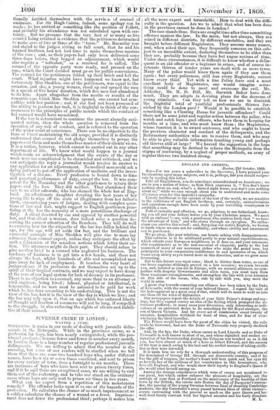ENGLAND AND AMERICA.
Boston, 22d October, 1860. SIR—For ten years a subscriber to the Spectator, I have perused your lucubrations upon many subjects, and it is, perhaps, fair you should recipro- cate by reading this letter. Like all Englishmen, you do sometimes misunderstand us Americans we are to you a nation of bores ; as Sam Slick expresses it, "You don't know nothing about us, and, what's a darned sight worse, you don't care nothing about us," while we care enough about you to understand and make some allowance even for this imperfect sympathy. Utterly indifferent to the opinion of the rest of the world, we are sensitive to the criticisms of our English brethren, and, certainly, animadversions and aspersions enough have been made by your travelling countrymen to establish a raw.
Full of curiosity and affection, we go, pilgrims, to our fatherland, know- ing you all and your fathers before you by your Christian names. We meet with an embrace ?—no, with a gentleman who stutters forth that "we have the advantage of him-;" and who stares through an eye-glass. No enthu- siasm can survive this rebuff; and, foregoing our native English, we hasten to lands where we care not for cordiality, and where civility and amusement can be purchased.
We go away, like poor relations our hearts aching -with disappointment.
This coldness is to be attributed partly to your natural superciliousness, which offends your European neighbours as it does us, and your unreason- able requirements as to the non-essential of etiquette, partly to the bad manners of many of our nouveaux riches who make the grand tour, but principally to your comparative indifference to and ignorance of us, which wears away slowly as you travel more in this direction, and as we grow more interesting.
But to this favour you must come : blood is thicker than water, as one of our brave captains strikingly proved on a late occasion ; we yearn towards you, and, isolated as you are in Europe, with no natural alliances, no sym- pathies with despotic Governments and alien races' you must turn from these wearisome entanglements, and strengthen the ties with your kinsmen on this side of the ocean, who, side by side with you, may meet the world in arms.
A great step towards cementing our alliance has been taken by the Duke of Newcastle, with the assent of your beloved Queen. I regard the visit of the heir-apparent as a great coup d'etat, which will do more to weld us into one than all the wiles of diplomates. Our newspapers report the details of your little Prince's doings and say- ings, but they cannot convey an idea of the feeling which prompted the at- tentions proffered ; in many cases poor diversions, only interesting as indi- cations of an universal desire to do something for the Royal stranger, the son of Queen Victoria. And for every act of commission count twenty of omission, hospitalities withheld for want of time, and for fear of over- whelming the tired traveller.
The Prince would have been the guest of the cities he visited, the rail- roads he traversed, had not the Duke of Newcastle very properly declined the offer.
And, by the bye, the Duke, whose career as Lord Lincoln and as Duke of Newcastle is well known to most of us, and whose dignified and modest re- signation of his Secretaryship during the Crimean war touched us as it did you, has been almost as much of a hero as Albert Edward, and the success of the tour is much owing to his tact and his cordial manner of taking civili- ties as they were intended.
It is upon him we rely for a thorough understanding of this progress of the descendant of George III. through our democratic country, and if he has the gift of tongues, the mother's heart will beat quick and her eyes fill as he tells her of the millions of her countrymen in this hemisphere, who lore old England, and who would show their loyalty to England's Queen if she would trust herself among us.
Among the strange coincidences which were of course not mentioned to our guest, but which rather enhance the pleasure of hospitality, are the arrivals of your fleet at Portland on the anniversary of the burning of that town by the British, the entree into Boston the day of Burgoyne's surren- der, the passing of the young ()minion between lines Of shouting Cambridge students, the day Cornwallis's army passed between Biwa of silent victors— events contrasting with the present as much as the pure Queen and her well-bred family contrast with her bigoted ancestor and his bully dissolute SOM.
IL L.


























 Previous page
Previous page